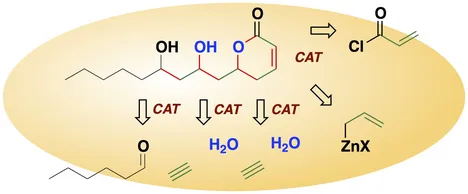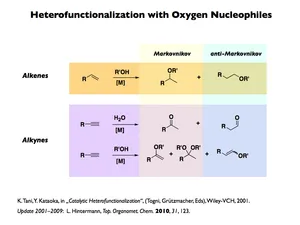Hintermann-Group Research Topics

Our research focus lies in the field of organic synthesis, where we develop new, efficient synthetic methodology based primarily on catalytic processes with metal complexes or small organic molecules as catalysts. We contribute to a future efficient and sustainable organic synthesis. By specifically developing waste-free (atom-economic) processes, we want to achieve synthetic efficiency, save resources, and reduce risks towards humans and the environment.
Current fields of work:
Catalytic Methods for Organic Synthesis:
- Hydrofunctionalization
- Cross-coupling Methodology
- Strategies in Catalysis: AMBI-CAT and HOT-CAT
- Asymmetric Organocatalysis
Synthesis as Tool in Bioorganic Chemistry: Firefly Oxyluciferin
- Chemistry of oxyluciferin
Topic: New catalytic methods for organic synthesis
We work with catalytic methodology, which has the potential to render organic synthesis particularly efficient. This includes work on catalytic anti-Markovnikov hydration of terminal alkynes. Furthermore, we have developed catalytic cross-coupling methodology that has opened direct routes to new ligand families or new substrates for other catalytic reactions.
We are concerned with concepts for catalysis development, such as the use of ambifunctional ligands (AMBI-CAT) or of very high temperatures for homogeneous catalytic reactions (HOT-CAT).
A) Catalytic hydrofunctionalization with oxygen nucleophiles
Catalytic hydrofunctionalization with oxygen nucleophiles (water, alcohols, carboxylic acids) proceed with atom-economy (no waste) and redox-neutrality (low energy consumption). These are very desirable reactions for sustainable organic synthesis, but several problems remain to be solved.
We want to develop new catalytic and stereoselective hydrofunctionalizations for organic synthesis. For more difficult reactions, we study fundamental aspects and want to realize first examples.
B) Catalytic coupling reactions
Catalytic coupling reactions play an important role in modern synthetic organic chemistry. We are interested in special aspects, such as:
D) Asymmetric organocatalysis
Our work in the field of organocatalysis is concerned with the development of new reactions that proceed with atom-economy, and with the study of structure/selectivity/activity relationships in chiral organocatalysts. We are particularly interested in cinchona alkaloids and their derivatives. Mechanistic work is also pursued.
Topic: Synthesis as tool in bioorganic chemistry
In connection with the HFSP-Project "Excited-state structure of the emitter and color-tuning mechanism of the firefly bioluminescence" we investigate the details of the light-emitting mechanism of the firefly. In an international cooperation with groups from Strasbourg (F; Michel Sliwa, Infrared and Raman spectroscopy), Lille (F; Pascal Didier, biophotonics) and Osaka/Abu Dhabi (JP/UAE; Pance Naumov, chemichal crystallography) we plan and perform complex experiments which profit from the expertise of all cooperation partners.
